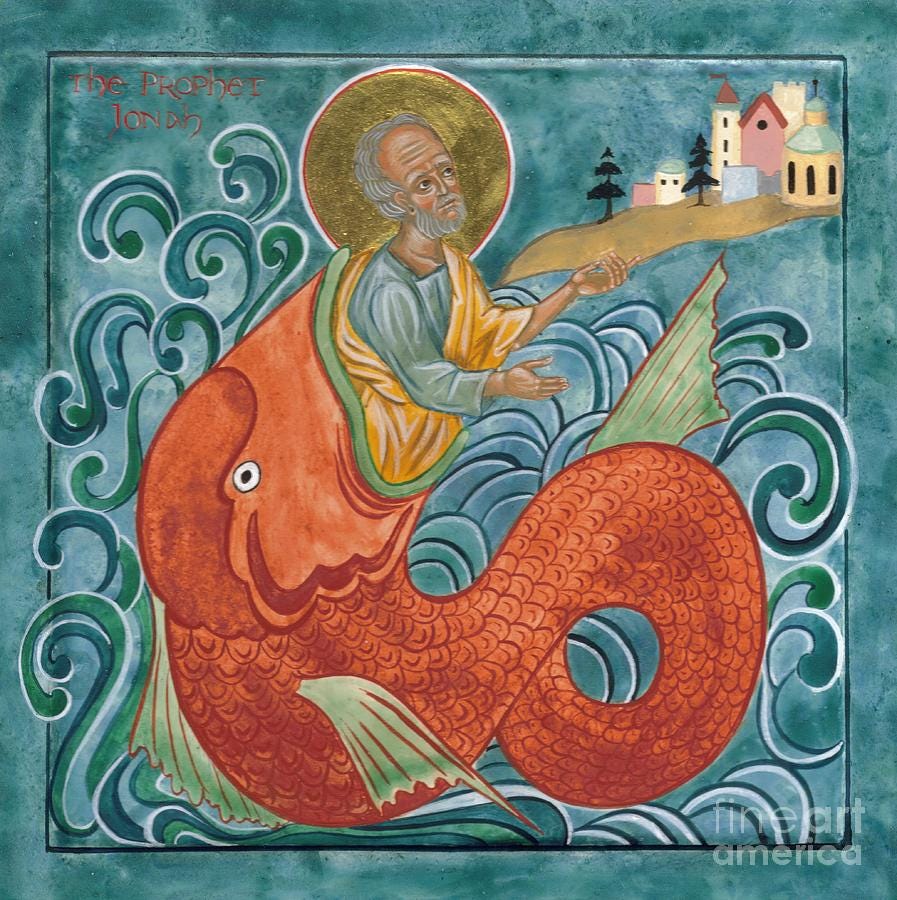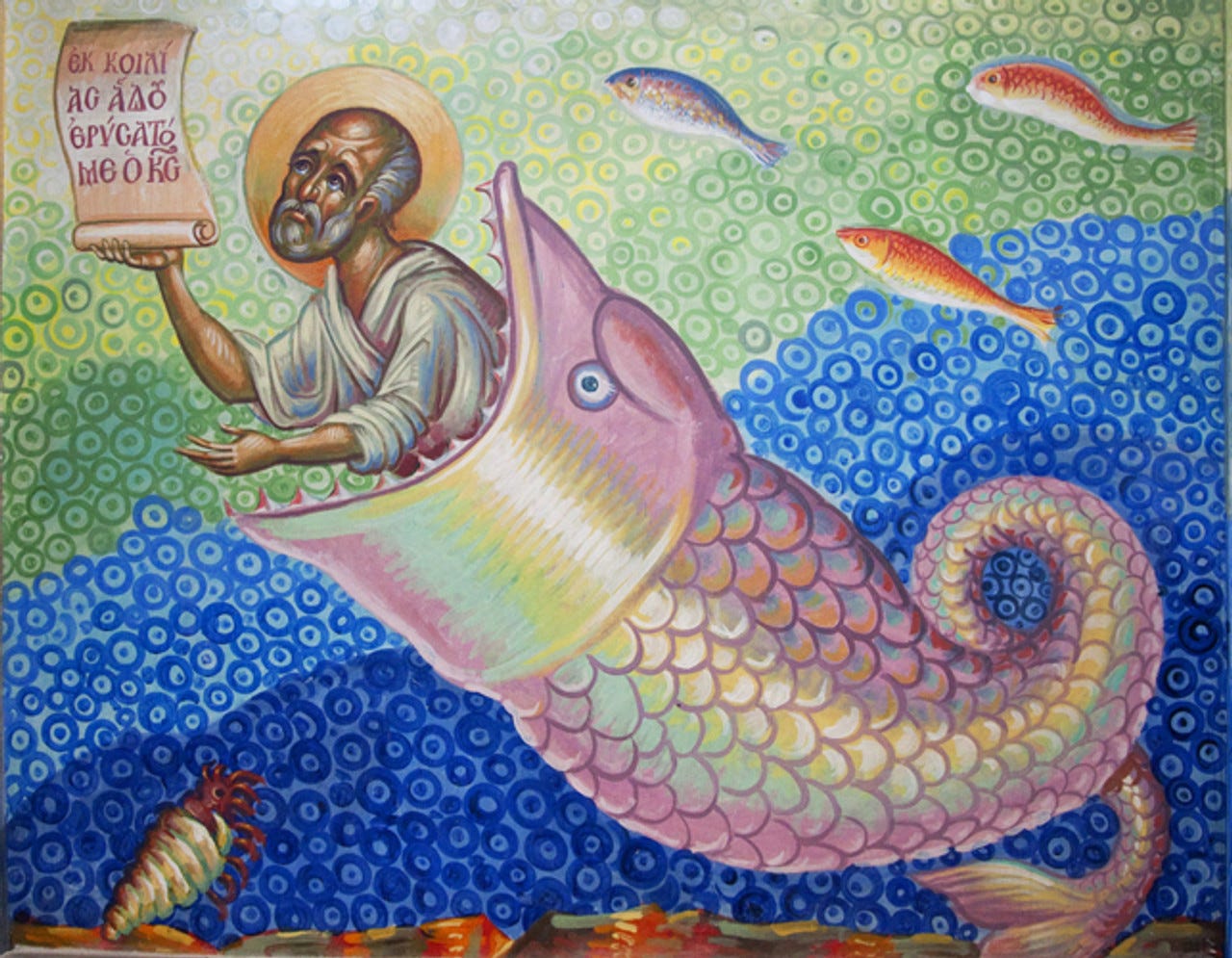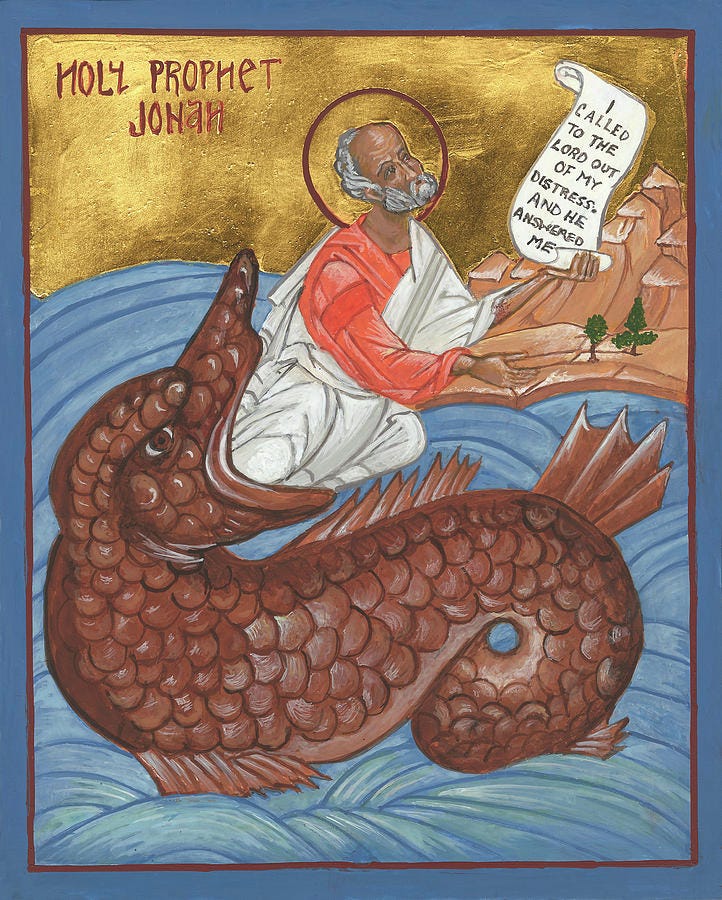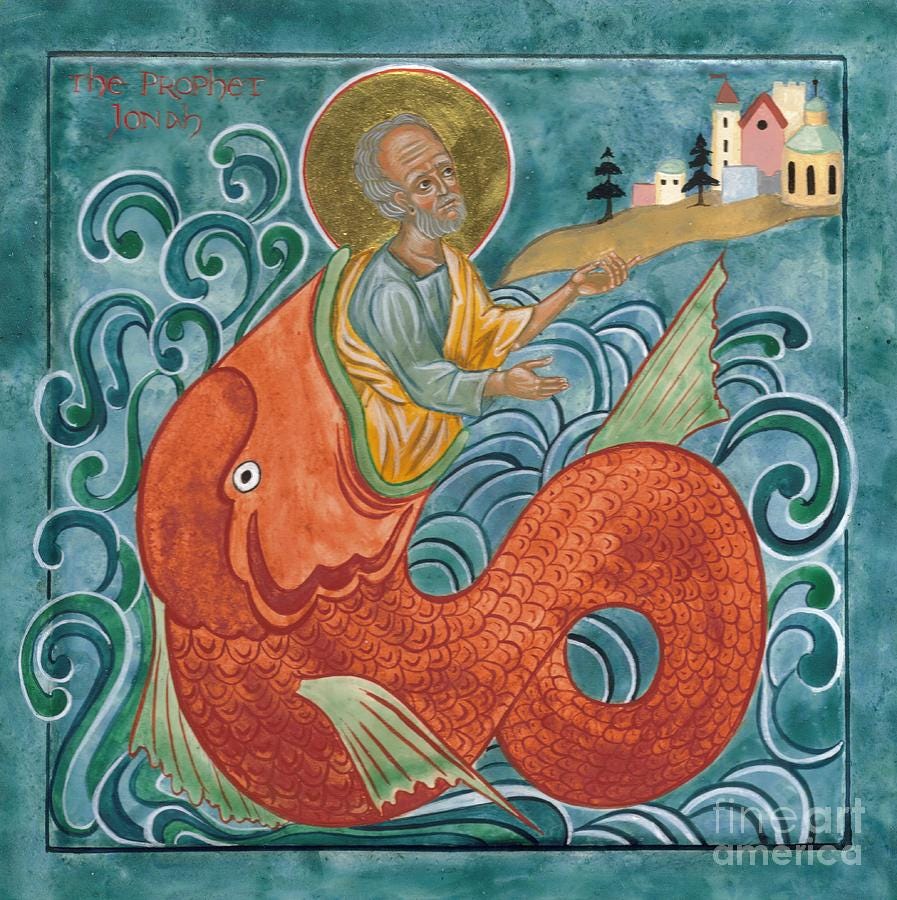The Third Sunday of Epiphany: Jonah 3.1-5, 10
Here is the sermon I preached for the saints and sinners at Christ Episcopal Church in Tulsa, Oklahoma.
Jonah and the Whale is one of the biblical passages best known by unbelievers.
In terms of vivid familiarity, Jonah and the Whale (actually, it’s a “large fish”) is on par with David and his Five Smooth Stones, Noah and the Flood, and Elijah and the Almighty’s Still, Small Voice. Paradoxically, most believers know very little of the narrative arc and the theological message of the Book of Jonah.
Jonah is no more a children’s story than yesterday’s dispatches from the West Bank.
According to the Book of Kings, Jonah was from Gath-Hepher, a village in the region that would become Galilee.
The Book of Jonah itself gives us no background material or biographical information.
Without an iota of introduction or warning, the Lord hijacks an otherwise anonymous believer’s life and calls him, “Go to Nineveh and preach.”
And Jonah responds, “To Nineveh?”
There is no verse in the hymn dedicated to the prophet Jonah, “Here I am, Lord, send me.” Instead Jonah hightails it to Tarshish.
To Tarshish!
Tarshish was in modern day Spain.
Nineveh, meanwhile, was in Assyria— Babylon: modern day Iraq.
Just so—
Called to go east, Jonah goes west.
Summoned to travel over land, Jonah runs to the shipyard in Joppa.
Deployed to the cosmopolitan city, Jonah buys a one-way ticket to escape to the end of the world where, he hopes, GOD IS NOT.
It’s in the midst of his attempted escape from God’s call that Jonah suffers the only part of the story you likely know.
Of course, the joke is on us.
A whale swallowing up Jonah and then spitting him up in the direction whence he came is not nearly as ridiculous as Jonah endeavoring to avoid a living God.
Jonah can no more slip loose of God’s summons upon him than the disciples could have resisted the Lord’s command to come and become fishers of men.
Again, everyone knows about the whale but few know the why behind Jonah ending up inside the whale.
Everyone knows about the whale.
But few know they WHY behind the whale.
It is not a children’s story.
It is a political story.
Nineveh was a growing city at the edge of the empire that would eventually invade the promised land, plunder its wealth, raze its Temple, and exile God’s elect people back to Babylon.
Ninevites tortured their captives with a violence so depraved it would make Hamas cringe.
Nineveh then celebrated their cruelty in the art and architecture of their mighty city. Thus, Ninevites were known as the “terrorists of the ancient world.”
Go to Nineveh and preach.
Leave Pennsylvania Avenue and go to Mar-a-Lago and preach.
The Israelites hated the Assyrians as much as Gazans hate Israel today.
The Israelites hated the Assyrians as much as Israelis hate Hamas today.
To them, God says, “Go.”
And because of them, Jonah says, “No.”
“I don’t want to hear about politics in church!”
During our second war in Iraq, I preached a sermon during Lent in which I discussed the use of state-sponsored torture, which the newspapers had only recently begun reporting. As soon as I handed over the benediction, a church member assaulted me in the narthex and, sticking his finger in my chest, hollered at me, “Just where do you get off preaching like that, preacher?!”
I stammered.
“Well, Senator,” I said, “It is Lent and the Lord was tortured to death.”
Senator Roberts of the Armed Services Committee shook his head and waved his finger at me.
“You tell me, preacher— if Jesus was still alive, do you honestly think he’d having anything to say about torture and the government?!”
“Um, well Senator, uh…I mean, he was crucified, I think...um...maybe he would have...” I started to say.
He shook his head and waved me off.
“Jesus would be rolling over in his grave if knew you’d brought politics into our church!”
Of course, that’s the rub.
It’s not our church.
What we call our church is his body.
We can insist, like Jonah, that our Lord keep out of our politics—that’s fine.
I’m not a sadist.
It makes my life easier—but notice how such insistence assumes that the Lord is not a living God.
I’m not being speculative.
Before the pandemic, having returned from vacation, I arrived back at church on a Tuesday morning with a long To Do list and my whole work week meticulously laid out.
Then our Lord, as he’s wont to do, messed up all my preconceived plans.
He dragged politics into his church.
And he strong-armed us into doing his work.
We were in the middle of a staff meeting.
A visitor buzzed the security intercom at Door #2.
“I need help,” she shouted into the speaker in hesitant, broken English.
Dottie, my secretary, buzzed her inside and then summoned me.
I walked to the main office and discovered a woman about my age, neatly but simply dressed, with her black hair pulled back taut.
Three children sat across the same sofa as her.
Their names, she told me, were Scarlett, Edward, and Denis—6, 12, and 14 years old respectively.
I offered her my hand and introduced myself in my broken Spanish.
She introduced herself as Carolina.
“I was a teacher,” she said out of the blue and looking like she was struggling to get the English right.
I must’ve looked confused because she went on to explain, and what she told me wasn’t what I was expecting nor was it what I wanted to hear with such a busy week before me.
“We just arrived here,” she said, “last night. From Nicaragua.”
I still wasn’t processing her situation and it must’ve showed because she quickly added: “We left Nicaragua fifty days ago.”
“Por qué?”
“My community very dangerous,” she said and wiped away tears, “I left—my home, my work—for them, for my children.”
And then, as best as she could, she told me about their journey, first by bus, then on foot, and finally stowed away in the back of a delivery truck.
Seeking asylum, they’d been separated and detained at the border and then eventually reunited and released on her own recognizance to report back at a later date.
She pulled a cell phone out of her back pocket and showed me the documents that corroborated her story, the first one stamped with her mug shot.
They arrived on a Monday and were living in the basement of an acquaintance less than a minute’s walk from the church.
Literally, a stone’s throw.
God apparently isn’t all that concerned with our concerns about keeping politics out of his church.
“Do you have any food?” I asked her.
“No.”
“Do you have a job lined up?”
“No.”
“Do you have a lawyer—an abogado?”
“No.”
“What about your children—are they registered for school?”
She shook her head and appeared overwhelmed.
“What are you going to do?”
This time she had an answer.
“I prayed and I prayed all last night,” she said, and she’d suddenly stopped crying and looked both serious and euphoric. “I prayed and finally God spoke. He answered me, and God said to me to come here.”
“Here?”
She nodded.
“God said to me that he’d make you help us.”
“He did, did he?”
And she smiled and shook her head and said “Yes.”
She said “Yes” emphatically, like she’d just witnessed a miracle.
“Isn’t that just like God,” I muttered under my breath, “he knows I don’t have time for one more thing and so he sends you my way.”
“Como?” she asked, confused by my mumbling to myself.
“Never mind,” I said, “it sounds like Jesus is determined for us to help you so what choice do I have?”
“None,” she said matter-of-factly, “no choice,” like it had been a serious question.
As though God had called me whether I liked it or not.
Once Jonah relents to God’s stubborn call upon him, the reluctant prophet walks a day into the depths of the city of Nineveh. In an empty parking lot, Jonah stakes up a big revival tent. He sprinkles saw dust on the ground, arranges rows of wooden benches, puts a big, black wooden Bible on the podium and rents a sound system. He tacks up promotional posters and passes out flyers all over town.
This is the original Guts Church.
Don’t forget—
Jonah is a Jew.
Jonah is an enemy of every single resident in the city.
He’d be sure to get a crowd. And he does. They come by the thousands with their children and their servants and their elderly parents, with with their dogs and their cats and their cows even. Even the King of Nineveh shows up with his Secret Service entourage and body man in tow.
Who knows what they expected?
Jonah, stilling reeking of whale vomit, simply mops his forehead, taps the microphone, clears his throat, and makes the speakers squelch.
And then Jonah says, “Forty days more and Nineveh will be overthrown.”
That’s it— an eight word sermon.
It’s not even gospel; it’s all law.
It’s just five words in Hebrew.
But those little words fell them all.
Everyone and everything repents on the spot. The King orders a fast and leads them all to put on sackcloth and ash. Even the cows and the goats and the cats— and maybe that whale too— they all repent. They all cry out mightily to God.
“Because who knows, “the King reasons, “the God of Israel may relent and change his mind about our judgment.”
And that is exactly what Jonah had wanted to avoid so badly he attempted to escape to the end of the earth.
We had to celebrate! Your brother was lost but now he’s found!
Like Jesus summoning the disciples from their fishing nets, Jonah knew the word works what it says.
And Jonah did not want his enemies to receive the mercy of his Lord.
And that’s the problem with a living God.
A dead god can be kept safely away from our politics.
A dead god can be conveniently conformed to our values and views.
A dead god can be easily accommodated to our lifestyle and livelihood.
But you cannot outrun a living and loquacious God.
I remember—
There was a young woman in one of the congregations I once served.
Her name was Ann.
She was a straight-A student at an Ivy League school.
She was nearing graduation, and her parents couldn’t have been more excited about what lay in her future: maybe a graduate degree at another prestigious school; maybe a career and no less than a six-figure salary.
Instead Ann threw them all for a loop and one day, out of the blue, announced to her parents that rather than doing anything they wanted, she was going to work in a clinic in some poor village in Venezuela.
I only found out about this when Annʼs mother burst into my office one day, clearly assuming I was the one who put the idea in her daughter’s head.
Red-faced and furious, she said: “Preacher, you’ve got to talk to her. You’ve got to convince her to change her mind. You’ve got to show her sheʼs throwing her life away.”
Ever the obedient minister, I met with Ann and communicated all her motherʼs fears: she was being naive, she was being irresponsible, she was being idealistic, her education should come first, she shouldnʼt jeopardize her career.
The Gospel’s about grace not works, I told her.
Ann looked back at me liked Iʼd disappointed her in some way. “Didn’t Jesus tell the young man to give up all his stuff and follow him?” she asked.
“Uh, well, yeah but...I mean...Jewish hyperbole and all...he couldnʼt have been serious...that wouldʼve been irresponsible. At least tell me why youʼre doing this.”
“Why do you think?” she asked like there could be only possible answer and it should be obvious. “Jesus sorta came to me and he spoke to me and he told me to go and do it.”
“He did, did he?”
And her eyes narrowed, like she was about lay a straight flush down on the table.
“Are you telling me, pastor, that I should listen to you instead of him.”
“Um, uh...okay, I think we’re done here. Just leave me out of it when you talk to your parents.”
It’s not a children’s story.
It’s a political story.
I know you want to keep politics out of the church.
I get it.
But the problem is, it’s not your church and the risen Christ, the Living God— he’s on the move.
He’s always going out, calling and conscripting.
And he is free to drop whatever work he chooses into your lap whether or not it obeys our boundaries of what’s acceptable.
The Lord is no respecter of propriety.
With pictures of asylum seekers all over the newspapers, God that week before the pandemic brought politics into my parish hall.
And just like that, God got us to working.
Meredith, our Children’s Director, found games to occupy the kids while they waited.
Peter, my associate pastor, put down what he was doing and left to stuff his trunk with food for them.
And I stared at the fourteen items I had on my To Do list for the day as I waited on hold, making calls all day long for Carolina, connecting her with the county, finding her a lawyer, locating services, resourcing her three kids.
When we drove them home later, I carried bags of food inside and I gave her my cell number and I told her that if there was anything else she needed to call me.
It was the sort of compassionate gesture you make to someone when you don’t really expect them to take you up on the offer.
Later that night I got a text from a number I didn’t recognize.
“This is Carolina,” it said, “thank you to you and your church.”
“De nada.”
And then I watched the text bubbles roll up and down as she texted another message. “The school say I need to go to Central Office to register my children.”
“How are you going to get there?” I texted back.
“I prayed,” she replied, “and God said you should take me.”
“He did, did he?”
“Si.”
And then the next text quickly followed.
“God say to tell you that I’m baptized. You have an obligation to me. As a brother. In Christ.”
“That’s the annoying inconvenience of worshipping a Living God,” I typed but didn’t send.
And so, thanks to Jesus, I spent most of the next day driving her and her children to get her kids registered and tested and immunized. And then the next day, Jesus apparently summoned my wife and son to go purchase school supplies for all of them.
At the end of the week, I mentioned all the details to Dottie, our secretary and she replied, “In order to be a pastor, you must have to really enjoy helping people in need.”
“Enjoy?” I asked, “Do you know many people in need? Most of them aren’t that enjoyable.”
“Then why did you choose to do it?”
“Choose? I didn’t choose it at all. I got summoned.”





















Share this post